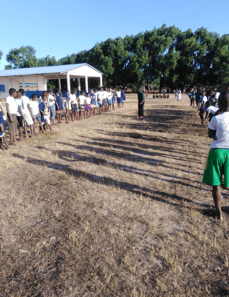The purpose of ESL summer camps are for students to learn in an experiential, fun, and active way. Creativity, exercise, and adventure are a big reason students prefer ESL summer camps over textbook-based classroom settings.
Creativity, exercise, and adventure are a big reason students prefer ESL summer camps over textbook-based classroom settings.
After completing my TESOL certification course with OnTESOL, I designed a week-long, action-packed ESL summer camp program for young learners in the village of Ampampamena in northern Madagascar. This program encouraged students to use their imagination at every moment, all while learning and reviewing English grammar and vocabulary.
Author: Jessica Whitehorne . OnTESOL graduate and ESL teacher in Madagascar.
Recommended TESOL certification courses for teaching ESL in summer camps worldwide: 120-hour online TESOL certificate course and 20-hour TEYL specialist course. Save $199 when you combine both courses
3 Fun Activities for Teaching English in Summer Camps:
1- Colorful Bracelet Making
During our art theme day, students have the opportunity to create bracelets, necklaces, and rings from colored beads. I use this ESL activity to introduce/review color to students. I separate each color of beads into cups for each group of students.
 Each student has an elastic string. I start by holding up a color, saying the color, and having the students repeat it after me. Then as a class, we create a bracelet together. A color is said and each student holds up the color, repeats the name, and then places it on the string. This continues until the class has created a unified bracelet.
Each student has an elastic string. I start by holding up a color, saying the color, and having the students repeat it after me. Then as a class, we create a bracelet together. A color is said and each student holds up the color, repeats the name, and then places it on the string. This continues until the class has created a unified bracelet.
You can let students take turns in saying a color to add to the bracelet. After this task, the students then have the opportunity to create their own items freely. They then present the necklace, bracelet, or ring to the class, or their group depending on the number of students, by describing what colors they’ve used to create their item.
In my experience, this activity works best with ESL students 8-10 years old.
2- Verb Race
 This activity helps students review verbs or action vocabulary.
This activity helps students review verbs or action vocabulary.
Before the activity starts, the teacher goes through a list of verbs and demonstrates the actions. The students mimic the action after the teacher. Then students work in pairs to complete the race activity.
One student is the racer and the other is the director. The director has a list of verbs ordered from 1-10. For example 1. Run, 2. Stop, 3. Hop 3 times, 4. Jump 4 times…and so on.
The student who is directing reads the list one at a time for their partner to complete the action. If their partner completes the action correctly, the director can move on to the next action until they complete all actions and the racer reaches the finish line.
The pair then switches roles. The team to complete both the actions correctly wins.
3- One, Two, Three, Shine!
This is a great ESL game to review numbers, especially when you have a large number of students.
Students are separated into two groups, opposite each other. There must be the same number of students on each side. Each student in both groups is given a number from 1 up to however many students there are; for example, 1- 40.
One student from each team has the same number. The teacher places an item in the center between the two teams, such as a ball.
When the student’s number is called, they race to the item to be the first to touch it. Whichever team member touches it first that team gets a point.
The game continues until the teacher goes through all the numbers at least twice. The team with the most points wins.
I usually switch up the student’s assigned numbers after a few rounds to keep them engaged in the activity.
The Importance of Interactive Outdoor Learning
Creating an interactive ESL Summer Camp experience can be challenging, but also an opportunity to create a positive, innovative, outdoor learning experience. With a variety of fun task-based activities, students use different skills in a setting that invokes their imagination, creating long-lasting learning.
Grammar and vocabulary games are extremely important to the ESL summer camp experience. They amuse students and sustain an interest in learning while encouraging the use of the English language in a creative and fearless manner. Different vocabulary games and activities continue to create a fun learning experience that doesn’t feel like normal classroom learning.





